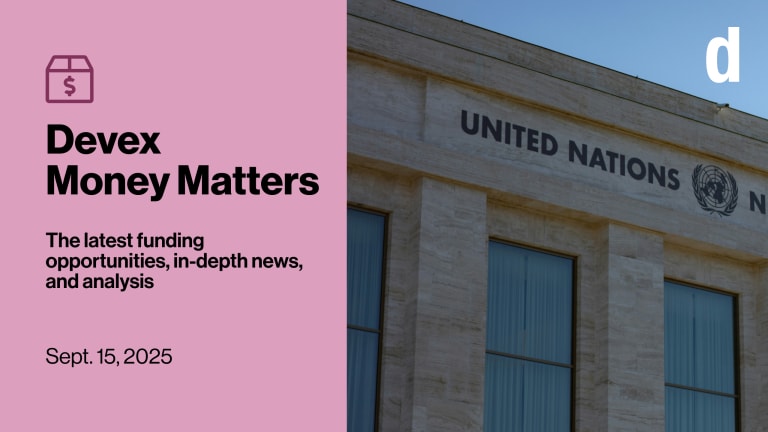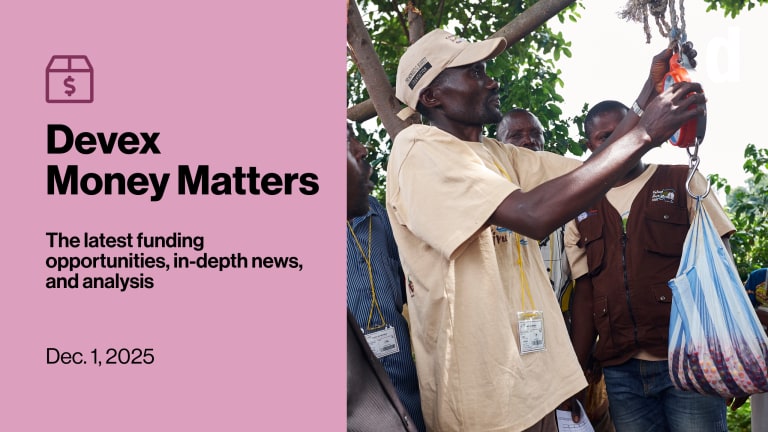
The Fourth International Conference on Financing for Development has officially begun — and over the next four days, thousands will touch down in Sevilla, Spain, to discuss how the world will pay for its most pressing challenges.
Spain is known for many things, from tapas and tinto to flamenco and bullfighting. One thing it’s not known for, however, is foreign aid — despite the fact that in recent years, it’s become one of the only countries bucking a downward trend.
Also in this edition: Cracking the code on Asian philanthropy, and more pullbacks from the United States.
+ Are there topics you want to read more about in Money Matters? We want your feedback.
Spain steps it up
Over the last few months, we’ve seen a fundamental shift in foreign aid spending. The United States has all but eviscerated the U.S. Agency for International Development, an agency that was once the world’s largest bilateral donor; the United Kingdom, Germany, and France have announced aid cuts of their own, reshuffling that spending for defense.
But for the last three years, the Spanish Agency for International Cooperation, or AECID, has doubled its annual budget to €708 million in grants, and added €400 million in annual lending capacity.
“While AECID’s initial budget was relatively modest and there is still ample room for growth, its recent efforts demonstrate that increasing ODA and strengthening frameworks is achievable,” says Rosaria Arbore, board member of La Coordinadora, a Spanish NGO coordination platform.
The country is still a small player among European giants, and it’s far from meeting a long-standing U.N. target: instead of spending 0.7% of its gross national income on aid, Spain allocates just 0.24% to ODA. But even so, Spain is pushing ahead while others are pulling back — and perhaps, that will help the world’s development financiers forgive Sevilla for its 110 degrees Fahrenheit heat this week.
Read: Spain’s aid budget is rising — but has a long way to go
+ I’ll be in Sevilla along with my colleague Jesse Chase-Lubitz, and we’ll be bringing you all the news from the Financing for Development conference.
Jesse has written a guide to what to expect at the conference, and you can check out my review of how things have changed since the last conference, a decade ago, in Addis Ababa, Ethiopia.
You can bookmark our focus page to keep track of all the latest developments. Or, if you’re there in person, come along to meet us at Casa Devex, just around the corner.
Funding activity
We publish tenders, grants, and other funding announcements on our Funding Platform. Here are some of those that have been viewed the most in the past 10 days.
The Inter-American Development Bank has approved a $350 million loan to support women entrepreneurs in Pakistan by improving their access to finance.
The World Bank has approved $101 million in funding to support governmental reforms aimed at modernizing the energy sector, enhancing social service delivery, and strengthening fiscal sustainability and the business environment in Kyrgyzstan.
The United Nations has launched a $3 million initiative to promote peacebuilding, social inclusion, and economic empowerment in Colombia.
The Global Fund to Fight AIDS, Tuberculosis and Malaria is seeking a consultancy firm to conduct an environmental and social impact assessment to replace nonfunctioning medical waste incinerators in Angola.
The International Fund for Agricultural Development is requesting quotations from qualified firms for the construction of eight animal welfare care centers in Turkey.
The Asian Development Bank is looking for a consulting firm to provide technical expertise on environment and biodiversity in India.
+ Try out Devex Pro Funding today with a free five-day trial, and explore funding opportunities from over 850 sources in addition to our analysis and news content.
Underground foundations
Despite all the troubles the aid sector faces, money does still exist — it might just be in new places. My colleague Raquel Alcega digs into what she calls Asia’s “quiet philanthropic revolution,” finding a growing trend of billionaires, foundations, and state-supported funders across the region. By 2026, Asian billionaires are expected to hold $4.7 trillion in wealth. But the way they give away that wealth is already looking vastly different from their Western counterparts.
“Many foundations in Asia don’t publish regular calls for proposals. Some — such as Tata Trusts in India or the Nippon Foundation in Japan — prefer to work closely with local agencies and long-standing partners,” Raquel writes. “Others, such as Tencent Foundation in China, channel donations through their own digital platforms and curated campaigns.”
We’ve created an insider guide to help you navigate foundations across Asia, one that offers practical guidance for executives, business development leads, and fundraising teams seeking to tap into the region’s philanthropic potential.
Read: How to unlock funding from Asia’s largest foundations
Event horizon
We’ve got a bumper crop of events coming up over the next two weeks. Here’s a quick guide to everything we’ve got in the pipeline.
• Today, we’ll be at Casa Devex to bring you all the latest from Sevilla. Attendance is in-person only.
• Also, tomorrow, we’ll be talking to a panel of experts on what happens next, now that what's left of USAID is being officially transferred into the State Department. Save your spot now for this event.
• Next Monday, July 7, we’ll learn from the Segal Family Foundation about its model, which centers trust and proximity. Register now.
• On July 9, we’ll be talking to experts in the field of outcomes-based finance and asking what happens to this growing market in the wake of discussions in Sevilla.
• And on July 10, we’ll have a call with up-and-coming funder GSR Foundation, about working at the intersection of crypto, emerging tech, and global development.
+ These events are exclusively for Devex Pro members. Not yet a Pro member? Start your 15-day free trial today to access all our expert analyses, insider insights, funding data, events, and more. Check out all the exclusive content available to you.
No injection for vaccines
Back to what has, for months, been the bread-and-butter of this newsletter: Washington, D.C., has announced another major blow to foreign aid.
Last week, Robert F. Kennedy Jr. — the U.S. secretary of health and human services — said the country won’t contribute to Gavi, the Vaccine Alliance until the organization works to “re-earn the public trust.”
The news was announced through a prerecorded message, which was broadcast at a high-level Gavi pledging event in Brussels. For nearly a year, the organization has been trying to raise $11.9 billion for its work vaccinating the world’s poorest children — and ultimately, it raised about $9 billion toward that goal.
“The Trump administration is turning its back on a program that has helped vaccinate more than a billion children and save over 17 million lives—while Kennedy spreads lies about science, safety and one of the world’s most effective public health efforts,” Liza Barrie, Public Citizen’s global vaccines access campaign director, wrote in a statement.
The United States is the organization’s third-largest contributor, accounting for 13% of Gavi’s annual funding last year. And in his announcement, RFK — a long-time vaccine skeptic — asked the organization to “justify” its funding, Devex’s health reporter Sara Jerving writes.
Earlier this year, the Trump administration excluded funding from Gavi in its 2026 budget request. But despite RFK’s announcement, the move isn’t entirely set in stone. It’s up to the U.S. Congress to decide how much it will spend — and earlier this year, lawmakers approved an additional $300 million for the organization’s work.
Read: Robert F. Kennedy Jr. says the US is cutting funding for Gavi
Read more: Gavi pledges fall short about $2.9 billion as US pulls out
+ For more content like this, sign up to receive Devex CheckUp, our free weekly newsletter that provides front-line and behind-the-scenes reporting on global health.
Rescission decision
When it comes to foreign aid, Gavi isn’t the only thing on Congress’ plate.
Last week, the White House’s budget chief, Russell Vought, pushed his $9.4 billion rescission package on lawmakers — stating that the multibillion-dollar clawback would not touch lifesaving programs, and instead, strip away “waste, fraud and abuse.”
“The American people didn’t fund this — they didn’t intend to, at least,” Vought said. “The American people voted for change.”
Senators were wary. Susan Collins, a Republican from Maine, highlighted how the programs the Trump administration disagreed with — many of which Vought mentioned in his testimony — had already been canceled. Brian Schatz, a Democrat from Hawaii, noted that the package didn’t specify which programs would actually be cut, referring to the rescission request as “big baskets of money.”
The House of Representatives has already passed the package, and the Senate has until July 18 to decide on the same. If both chambers do not approve the cuts, the Trump administration will be required to spend the money as originally mandated.
Read: White House defends $9.4 billion clawback amid Senate concerns








